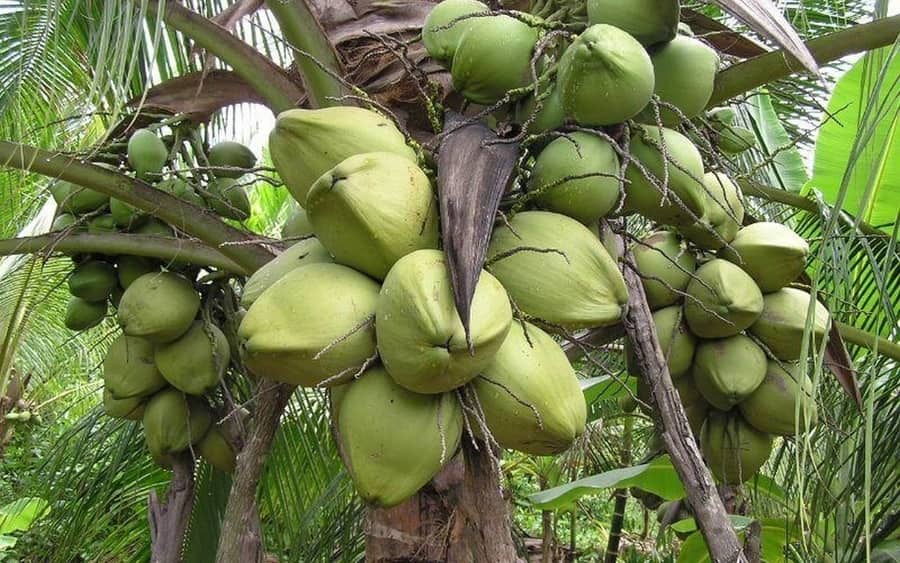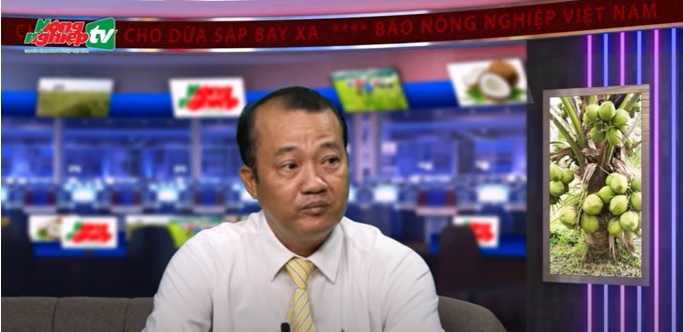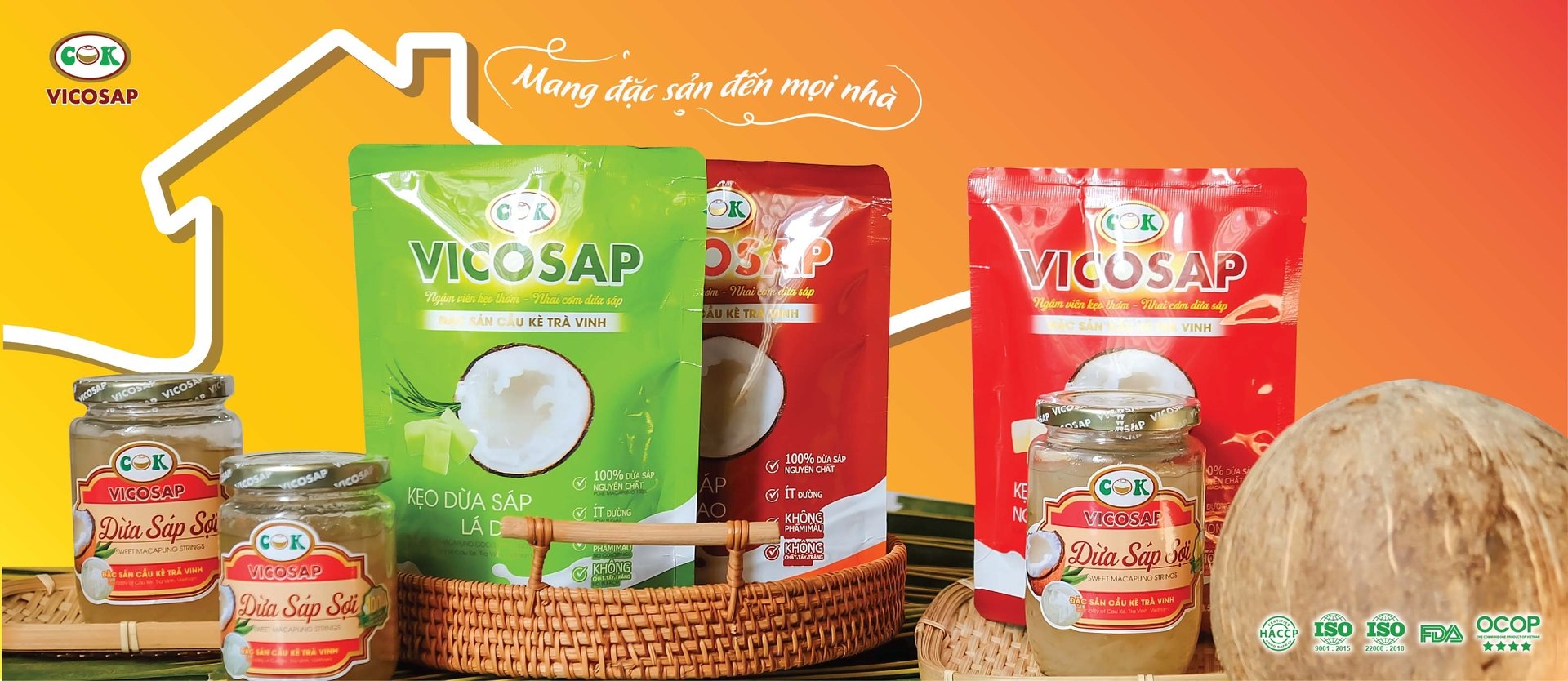June 18, 2025 | 16:00 GMT +7
June 18, 2025 | 16:00 GMT +7
Hotline: 0913.378.918
June 18, 2025 | 16:00 GMT +7
Hotline: 0913.378.918

Mr. Tran Duy Linh, Director of Cau Ke Macapuno Processing Co., Ltd., shared with Vietnam Agriculture News about the company's path of researching and develoing macapuno products.
In July 2020, Cau Ke Macapuno Processing Co., Ltd. (Vicosap) officially went into operation in the field of deep processing of macapuno. Vicosap has launched many macapuno products on the market and gained consumers’ trust, thereby affirming the company's name and position. Looking back on the past journey, Director Tran Duy Linh shared about the research and development process of products made from macapuno.
Born and raised on the land of Cau Ke, Mr. Tran Duy Linh is always concerned when he sees the macapuno products of his homeland being sold on the roadside as a fresh fruit product for a gift or a stopover. There are no deep-processed products, so the value is not high. In particular, when the market fluctuates, it becomes more and more difficult to consume macapuno. From that concern, Mr. Linh decided to choose macapuno, the specialty of Cau Ke Tra Vinh, as the raw material for the company to start up.
When choosing macapuno as a processing raw material, the company researched and launched a variety of products made from macapuno, such as three-flavor macapuno candy, dried macapuno and crispy dried macapuno with five flavors, yogurt fermented from macapuno water, and copra with six flavors, to sell to the market. Especially macapuno strings, the first product line appearing in Vietnam.

When choosing macapuno of Cau Ke district, Tra Vinh as a raw material for deep processing, Vicosap faced many difficulties.
Moreover, in April 2023, the company launched a new product line. It is a nutritious cake made from macapuno, which is a combination of macapuno and some agricultural materials from the locality and Tra Vinh, to launch a product line that is nutritionally better for consumers’ health.
When choosing macapuno as a raw material for deep processing, Vicosap faced many difficulties in the early stages. First of all, no units have ever deeply researched macapuno before, so the company does not have the opportunity to access processing technology. The company must conduct its own search for the appropriate equipment for the processing process.
Second, there is the issue of preservation. Macapuno has an extremely high oil content, so preserving coconut is also very difficult. The company also encountered many difficulties in the research phase, consuming a lot of raw materials and incurring a lot of costs to come up with a certain formula.
Third, the company faced many difficulties in promotion. Up until now, macapuno was only known as a freshly processed food and a kind of fruit. “When launching processed products, we invite and promote them, but customers do not believe that macapuno can make such a product. The company has to develop a very strong communication channel to disseminate the information. In addition, thanks to all levels, branches, and local authorities for supporting promotion, customers gradually acknowledged that macapuno is also processed deeply, with more diverse products,” said Mr. Linh.

Mr. Le Van Dong, Deputy Director of the Tra Vinh Department of Agriculture and Rural Development, said that the province gives supporting policies for the development of macapuno products.
Up to now, the company has also launched seven product lines and less than 20 SKUs (stock keeping units) that are deeply processed from macapuno for consumers. Currently, the company's products are well received by customers, especially by supermarket systems nationwide, and the products have been exported to the US and Japanese markets.
According to Mr. Le Van Dong, Deputy Director of the Tra Vinh Department of Agriculture and Rural Development, Tra Vinh province is paying special attention to supporting coconut trees in general and macapuno trees in particular. Specifically, the Provincial People's Council has also issued Resolution No. 03 dated March 19, 2021, on restructuring the agricultural sector in the 2021–2025 period.
The first support policy is from the province’s budget. This policy first aims to support the development of product stories and support labels and packaging for the establishment and subject. The resolution of the Provincial People's Council also included supporting funding for establishment construction. Second, the support policy is to support the equipment and closed line for production. Third, the support policy is to support stamps and labels.
The second support policy is from the central government, which is the capital of the national target program on building a new-styled rural area, One Community, One Product. This policy has also been allocated and especially assigned to the subjects to develop OCOP products, focusing on building labels, product lines, and packaging and then supporting classes such as training for staff to develop the market. On that basis, the establishment is eligible to reach further.
The third support policy is from the Central Government for subjects as well as OCOP products to promote trade and attend domestic forums and fairs. Thus, the establishment as well as the subject have conditions to create a consumption linkage of products to the market.

A variety of Vicosap products deeply processed from macapuno, including macapuno strings, are awarded OCOP certification.
Facing the difficulties encountered, Vicosap has identified the OCOP products as the key to success. OCOP certification is like an entry and exit permit. When a product is affixed with the OCOP stamp on the package, consumers will feel more secure buying it. With OCOP products, partners such as supermarkets or some specialty stores are more confident in selling them, and they will facilitate the products’ participation in supermarket chains.
Especially when certified OCOP, businesses can get support and access to capital from projects supporting small and medium enterprises. In addition, businesses with OCOP products will be supported for trade promotion to connect goods trading and, specifically, for equipment so that the company can perfect production capacity.
At present, many processed products branded Vicosap are certified 4-star OCOP, including a product with the potential for 5-star status, which is macapuno strings. For the company, the fact that products are certified OCOP is a great success and also a motivation for the company to research and develop more products from macapuno in the coming time.
Translated by Huyen Vu Thu
/2025/06/17/3942-2-143243_548.jpg)
(VAN) Recently, in Sweden, the Secretary of the Binh Dinh Provincial Party Committee presented the Investment Registration Certificate for the 'Polyester Fabric Recycling Complex' project to SYRE Impact-AB Company.
/2025/06/12/3721-2-202745_83.jpg)
(VAN) TH made an impression at Seoul Food 2025 with its line of natural beverages, paving the way for Vietnamese food products to enter the South Korean market.

(VAN) Soc Trang's success in rice exports stems from a strategy of developing fragrant and specialty rice cultivation areas and standardizing production toward low-emission practices.
/2025/06/11/1311-5-120811_839.jpg)
(VAN) The pig farming industry is facing the challenge of comprehensive restructuring to meet requirements for quality, safety, traceability, and market expansion both domestically and for export.

(VAN) Vietnam considers participating in ALGROALBA in order to expand agricultural production, coordinate the assessment and effective exploitation potential land.
/2025/06/05/5314-1-184727_407.jpg)
(VAN) From seemingly worthless fish scales and skin, enzymes and lactic ferments can transform by-products into peptides, opening a sustainable, effective business direction and elevating Vietnamese seafood.

(VAN) TTC AgriS and IFC signed a strategic partnership to develop a sustainable agricultural value chain, aiming to achieve the Net Zero target by 2035.